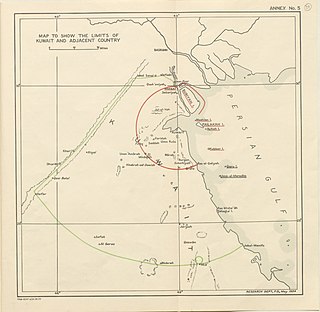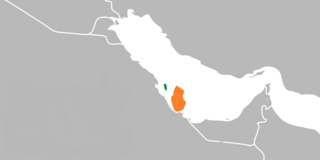
The history of Qatar spans from its first duration of human occupation to its formation as a modern state. Human occupation of Qatar dates back 50,000 years, and Stone Age encampments and tools have been unearthed in the Arabian Peninsula. Mesopotamia was the first civilization to have a presence in the area during the Neolithic period, evidenced by the discovery of potsherds originating from the Ubaid period near coastal encampments.
Bahrain was a central location of the ancient Dilmun civilization. Bahrain's strategic location in the Persian Gulf has brought rule and influence from mostly the Persians, Sumerians, Assyrians, Babylonians, Portuguese, the Arabs, and the British.

The Cooperation Council for the Arab States of the Gulf, also known as the Gulf Cooperation Council, is a regional, intergovernmental, political, and economic union comprising Bahrain, Kuwait, Oman, Qatar, Saudi Arabia, and the United Arab Emirates. The council's main headquarters is located in Riyadh, the capital of Saudi Arabia. The Charter of the GCC was signed on 25 May 1981, formally establishing the institution.

The Anglo-Ottoman Convention of 1913, also known as the "Blue Line", was an agreement between the Sublime Porte of the Ottoman Empire and the Government of the United Kingdom which defined the limits of Ottoman jurisdiction in the area of the Persian Gulf with respect to Kuwait, Qatar, Bahrain, and the Shatt al-Arab. It was signed on 29 July 1913, but never ratified. The long-lasting impact of the agreement was that of the status of Kuwait; the basis for both formal independence and the frontiers of modern Kuwait were established.

Abu Musa is an Iranian 12.8-square-kilometre (4.9 sq mi) island in the eastern Persian Gulf, found near the entrance of Strait of Hormuz. Due to the depth of sea, oil tankers and big ships have to pass between Abu Musa and Greater and Lesser Tunbs, making these islands some of the most strategic points in the Persian Gulf. The island is under the administration of Iran, as part of the Hormozgan province.

Zubarah, also referred to as Al Zubarah or Az Zubarah, is a ruined, ancient town located on the northwestern coast of the Qatar peninsula in the Al Shamal municipality, about 65 miles or 105 kilometres from the capital Doha. It was founded by Shaikh Muhammed bin Khalifa, the founder father of Al Khalifa royal family of Bahrain, the main and principal Utub tribe in the first half of the eighteenth century. It was designated a UNESCO World Heritage Site in 2013.

The Arab states of the Persian Gulf refers to a group of Arab states bordering the Persian Gulf. There are seven member states of the Arab League in the region: Bahrain, Kuwait, Iraq, Oman, Qatar, Saudi Arabia, and the United Arab Emirates. Yemen is bound to the six countries of the Gulf Cooperation Council, based on history and culture.

Eastern Arabia, is a region stretched from Basra to Khasab along the Persian Gulf coast and included parts of modern-day Bahrain, Iraq, Kuwait, Oman, Qatar, Saudi Arabia, and the United Arab Emirates. The entire coastal strip of Eastern Arabia was known as "Bahrain" for a millennium.

Qatar, officially the State of Qatar, is a country in West Asia. It occupies the Qatar Peninsula on the northeastern coast of the Arabian Peninsula in the Middle East; it shares its sole land border with Saudi Arabia to the south, with the rest of its territory surrounded by the Persian Gulf. The Gulf of Bahrain, an inlet of the Persian Gulf, separates Qatar from nearby Bahrain. The capital is Doha, home to over 80% of the country's inhabitants. Most of the land area is made up of flat, low-lying desert.
This article deals with territorial disputes between states of in and around the Persian Gulf in Southwestern Asia. These states include Iran, Iraq, Kuwait, Saudi Arabia, Bahrain, Qatar, the United Arab Emirates (UAE), and Oman.

Bahrain, officially the Kingdom of Bahrain, is an island country in West Asia. It is situated on the Persian Gulf, and comprises a small archipelago made up of 50 natural islands and an additional 33 artificial islands, centered on Bahrain Island which makes up around 83 percent of the country's landmass. Bahrain is situated between Qatar and the northeastern coast of Saudi Arabia, to which it is connected by the King Fahd Causeway. The population of Bahrain is 1,501,635 as of May 14, 2023, based on elaborations of the United Nations data, of whom 712,362 are Bahraini nationals. Bahrain spans some 760 square kilometres (290 sq mi), and is the third-smallest nation in Asia after the Maldives and Singapore. The capital and largest city is Manama.

Bahrain–United Kingdom relations are the bilateral relations between Bahrain and the United Kingdom. Bahrain has an embassy in London and the United Kingdom is one of only four European countries to maintain an embassy in Manama. Bahrain gained independence from the United Kingdom in 1971 and has since maintained strong diplomatic, military and trade relations.

The Trucial States, also known as the Trucial Coast, the Trucial Sheikhdoms, Trucial Arabia or Trucial Oman, was a group of tribal confederations to the south of the Persian Gulf whose leaders had signed protective treaties, or truces, with the United Kingdom between 1820 and 1892.

The Qatari-Bahraini War, also known as the Qatari War of Independence, was an armed conflict that took place in 1867 and 1868 in the Persian Gulf. The conflict pitted Bahrain and Abu Dhabi against Qatar. The conflict was the most flagrant violation of the 1835 maritime truce, requiring British intervention. The two emirates agreed to a truce, mediated by the United Kingdom, which led to Britain recognizing the Al-Thani family of Qatar as the semi-independent ruler of Qatar. The conflict resulted in wide-scale destruction in both emirates.

Bilateral relations exist between the State of Qatar and the Kingdom of Bahrain. They first began in 1971.

Piracy in the Persian Gulf describes the naval warfare that was prevalent until the 19th century and occurred between seafaring Arabs in Eastern Arabia and the British Empire in the Persian Gulf. It was perceived as one of the primary threats to global maritime trade routes, particularly those with significance to British India and Iraq. Many of the most notable historical instances of these raids were conducted by the Al Qasimi tribe. This led to the British mounting the Persian Gulf campaign of 1809, a major maritime action launched by the Royal Navy to bombard Ras Al Khaimah, Lingeh and other Al Qasimi ports. The current ruler of Sharjah, Sultan bin Muhammad Al Qasimi argues in his book The Myth of Piracy in the Gulf that the allegations of piracy were exaggerated by the East India Company to cut off untaxed trade routes between the Middle East and India.
Qit'at Jaradah is a cay in the Persian Gulf to the east of Bahrain Island, located 32 km (20 mi) east of Manama, the capital of Bahrain. Historically, the feature was only above the water during spring low tide; it sits approximately midway between Bahrain and Qatar, within the 12-mile (19 km) territorial waters of both countries. It was one of several maritime features contributing to a long running dispute between Bahrain and Qatar.
The Qatar diplomatic crisis was a high-profile incident involving the deterioration of ties between Qatar and the Arab League between 2017 and 2021. It began when Saudi Arabia, the United Arab Emirates, Bahrain, and Egypt simultaneously severed their bilateral relations with Qatar and subsequently banned Qatar-registered aircraft and Qatari ships from utilizing their sovereign territory by air, land, and sea; this involved the Saudis' closure of Qatar's only land crossing, initiating a de facto blockade of the country. Tensions between the two sides came to a close in January 2021, following a resolution between the Saudis and the Qataris.

Saudi Arabia–Qatar relations refers to the current and historical relationship between the Kingdom of Saudi Arabia and the State of Qatar. Prior to 2017, the two countries maintained cordial ties. Qatar was mainly subservient to Saudi Arabia in matters relating to foreign policy. Hamad bin Khalifa Al Thani's assumption of power saw Qatar reclaim its sovereignty in foreign affairs, often diverging from Saudi Arabia on many geopolitical issues. In 1996, the Qatari government launched Al Jazeera in a bid to consolidate soft power. One of the most watched news stations in the Arab world, Al Jazeera proved to be a wedge in the two's bilateral relations as it routinely criticized Saudi Arabia's ruler. The network also provided a platform for Islamist groups which are considered a threat to Saudi Arabia's monarchy.

Open slavery existed in Bahrain until the 1930s. Slavery was formally abolished in Bahrain in 1937. Slavery ended earlier in Bahrain than in any other Gulf state, with the exception of Iran and Iraq. Many members of the Afro-Arabian minority are descendants of the former slaves. Slavery of people from Africa and East Asia was succeeded by the modern Kafala system of poor workers from the same region were slaves had previously been imported.














